Meral Polat Trio in Istanbul for new album. An interview by music journalist Ton Maas.
Fast Forward for Meral Polat Actress further spreads her wings as a singer Monday, May 6, 2024
With a visit to Istanbul, along with her trio and regular sound technician, singer Meral Polat recently completed the final component of a two-year support program by the Performing Arts Fund. This program enables talented ‘mid-career makers’ to spread their wings and take a new step in their artistic development. Ton Maas went along for MixedWorldMusic to report on it and reflects with Polat on two years of ‘Fast Forward’.
By Ton Maas (text and photos – click on the first photo and scroll through the extensive photo report)
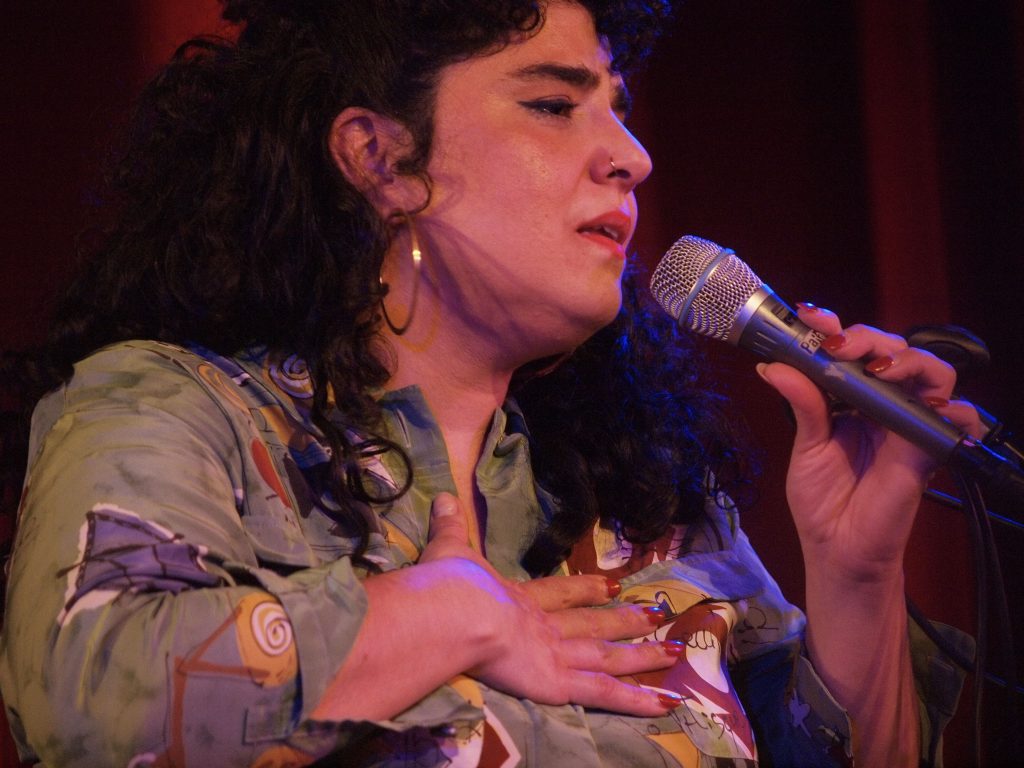
It’s a strange idea that behind the unassuming facade of the building at Ilk Belediye Caddesi 6, there are no less than nine professional, state-of-the-art recording studios. But this is Istanbul, and just like with jewelers, the lighting industry, and other fields, almost everything related to music is conveniently clustered in a single street or neighborhood. Meral Polat (emphasis on the ‘a’ in both names) has settled here with her trio and regular sound technician for a few days to conclude her Fast Forward trajectory, a two-year program by the Performing Arts Fund to enable talented ‘mid-career makers’ to spread their wings internationally.
Another Side of Turkey On the second floor is Bej (beige), the studio Polat rented for a few days for sessions with some contemporary musicians from the city who, like herself, have roots in tradition. She also wants her team, after their previous visit to Dersim, the birthplace of her parents in the east of the country, to experience a very different side of Turkey in this historically cosmopolitan metropolis where East meets West. Additionally, this is the epicenter of the Turkish music business, making Istanbul the place to be for those seeking collaboration opportunities with local production companies, agents, or labels.
Eye Contact with the Musicians Sound technician Anthony Kappel is, of course, present as the fourth band member. He sits in the control room at the controls, or rather at the computer keyboard, because like in many other modern recording studios, the traditional mixing console with its dozens of faders and rows of knobs is conspicuously absent. Anthony is enthusiastic about all the new possibilities digital technology offers but misses the old-fashioned mixing desk placed across the studio window, allowing for eye contact with the musicians.
Working on a New Album After Meral, Chris, and drummer Jens Bouttery (who started as a substitute for Frank Rosaly but is now a permanent band member) spent the morning tweaking and refining some new compositions, saxophonist Can Ömer Uygan from Istanbul’s vibrant jazz scene arrives around noon. The plan is to try out some ideas together and have Uygan record a trumpet part for a previous recording for the new CD set to release early next year. But first, a long lunch is necessary.
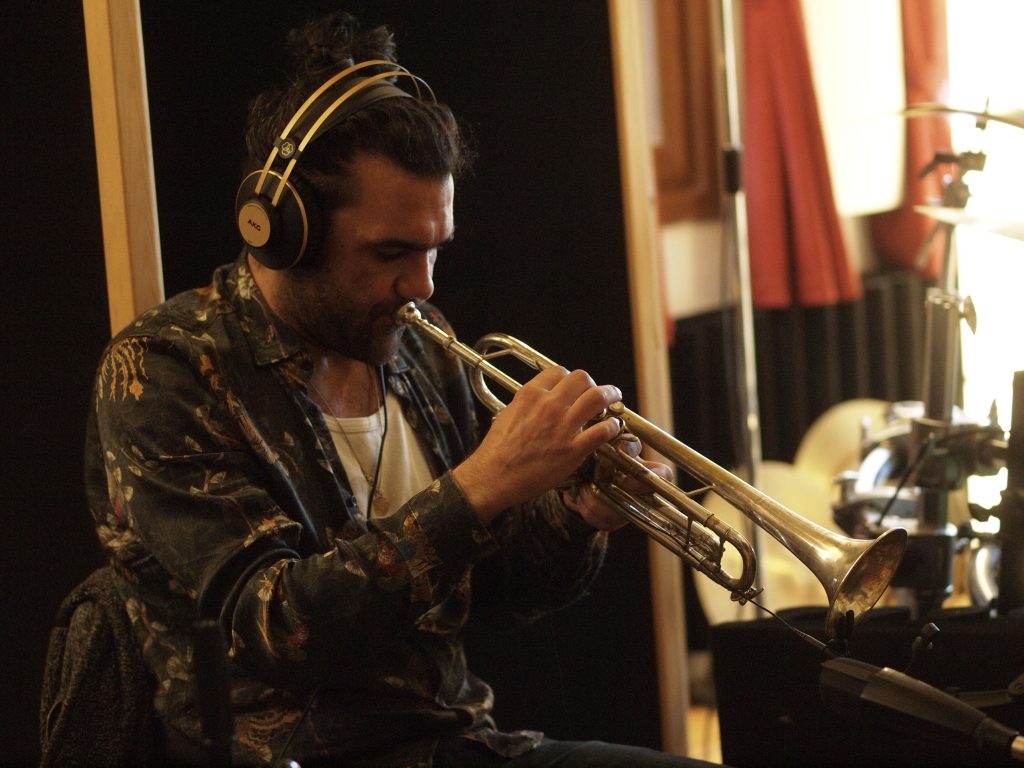
‘Part of the Process’ When the session finally starts about two hours later, Anthony signals within seconds that something is wrong. There’s a persistent hum with an unclear origin. Kappel dives into the studio, pulling plugs and checking connections. After much searching, the switching power supply of one of Uygan’s effect pedals turns out to be the culprit. Since the trumpeter has another appointment at five and needs to leave early due to Istanbul’s chronic traffic, there’s just enough time for a brief group improvisation and recording the desired trumpet part. ‘Part of the process,’ sighs Kappel with a grin. ‘But it’s well recorded now, and yesterday we had a great session with Murat Ertel.’
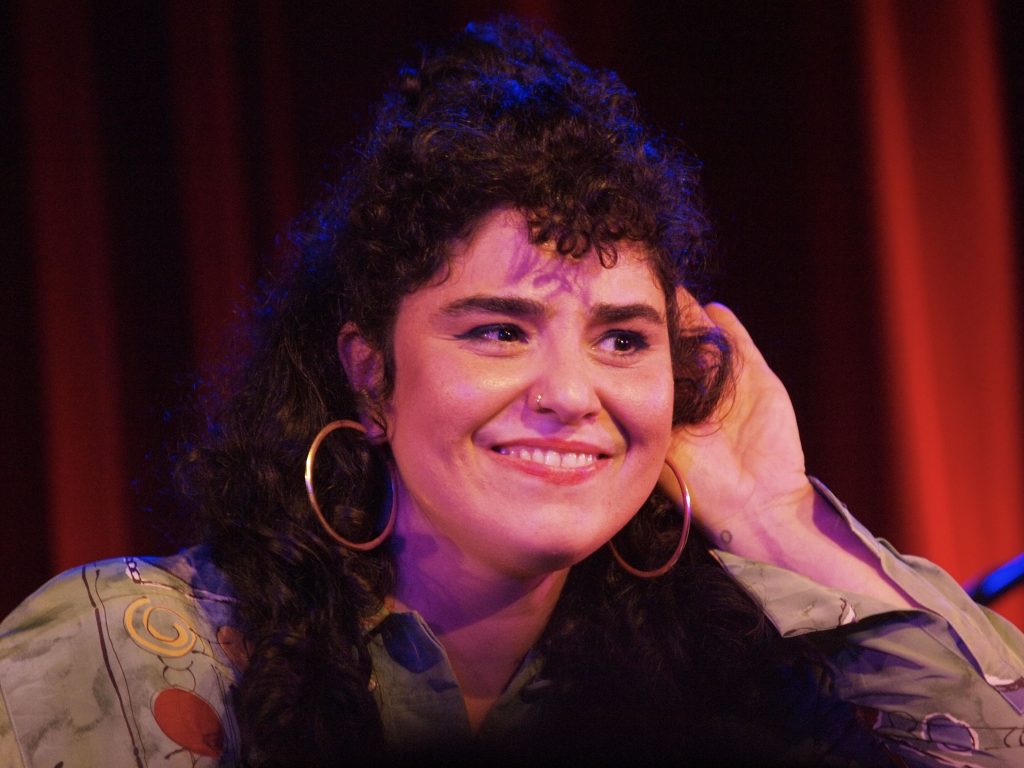
Two Years of Fast Forward In Amsterdam, Polat later reflects on two years of Fast Forward: ‘This trajectory came at exactly the right moment in my life and perfectly aligned with what I was working on! The support is meant to enable you to develop, grow, and deepen your content but also to strategically develop in an area where you’re not yet fully at home. And all this is particularly aimed at engaging in international collaboration. Where I am now as a singer, musician, composer, and leader of this fantastic band, I could never have reached without Fast Forward.’
Father’s Death as a Turning Point Meral Polat gained fame as an actress in productions like Gesluierde Monologen and the family performances of Ro Theater. But it was mainly thanks to the TV series De Luizenmoeder that she became nationally known. The unexpected death of her father, Ali Ihsan Polat, in 2020 was a turning point. ‘I knew he wrote poems occasionally. But after his death, I found a whole drawer full of notebooks with texts and poems in Kurdish and Turkish. That was the moment I decided to prioritize music and singing, to give my father’s poetry a new life.’ Encouragement came from theater maker and musician Paul Koek, artistic director of De Veenfabriek and Meral’s director and coach for many years. He also introduced her to Chris Doyle, who then suggested involving Frank Rosaly in the project. Thus, the Meral Polat Trio was born.
Playing with Sounds Although she grew up with two Kurdish parents, Meral had to take lessons to sing in Kirmanca (her father’s dialect). ‘At home, besides Dutch and Turkish, my mother’s and grandparents’ dialect (Zazaki) was mainly spoken. My parents mostly used my father’s Kirmanca as a kind of secret language for matters that didn’t concern us children. So, I was familiar with the sounds but didn’t understand it. It’s still a language where I can play with sounds without the literal meaning getting in the way. The fact that my audience often doesn’t understand the lyrics is not a problem for me. Behind the language are sounds, frequencies, and, of course, emotion. And all of this resonates in your body. It’s all communication, and it all has meaning, even if it’s often hard to put into words.’
Tradition Resonates in Everything The fact that Polat sings in both Kurdish and Turkish is controversial in both communities. She realizes some people will never come to her concerts for this reason alone. But she isn’t deterred and not all reactions are negative: ‘I recently received a nice message on Instagram from a Kurdish person who wrote: “It’s great that you sing in Turkish, but Turkish music doesn’t need you. Kurdish music really needs you!” A boost and encouragement to sing even more in Kurdish. And that while I certainly don’t adhere strictly to tradition. Not in its form, at least. But everything I say and sing reflects what my parents and grandparents have told me. Yet I will also continue to sing in Turkish. I understand the sensitivity among Kurdish people who see Turkish mainly as the language of the oppressor, but it’s also just my language, just as Dutch is.’
Winding Lines and Unpredictable Accents Listening to Ez Kî Me (Who Am I), the debut album of the Meral Polat Trio, apart from the language and the oriental-sounding vocal ornaments (melismas), one wouldn’t find much typically Kurdish or Turkish. Most songs have a bluesy groove laid out by Doyle with repetitive patterns on his guitar or organ. Over this, Polat’s vocal lines wind, while Rosaly adds unpredictable rhythmic accents. ‘We’re thinking about ways to further expand our sound palette. This was our guiding principle in choosing musicians for the sessions in Istanbul. You experienced Can, the trumpeter, in the studio. Besides being impressed by his sound and the freedom in his playing, we were curious about the possibilities a wind instrument could offer alongside Chris’s guitar and organ. We chose Murat Ertel from the psychedelic and experimental pop group Baba Zula because of his unique sound on the electric baglama (long-necked lute) and other self-developed string instruments.’
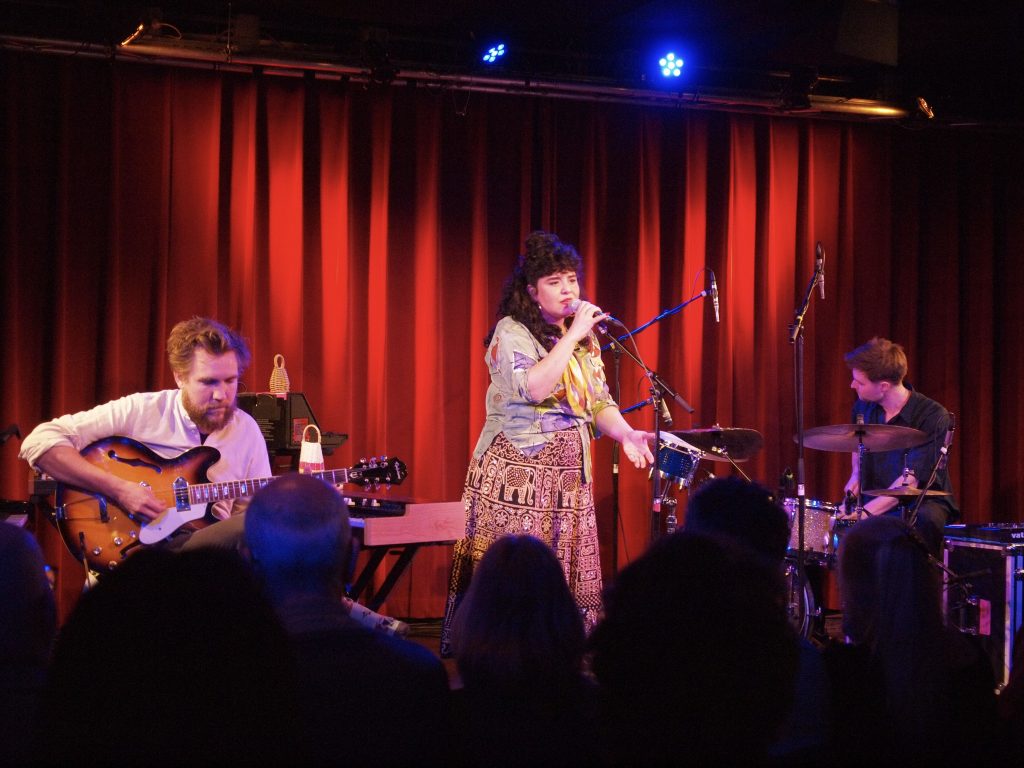
A Tough Lesson Learned Not everything in Istanbul went smoothly. Meral explains: ‘I decided to outsource the organization of the trip to a local producer. I made contact well in advance and explained exactly what we wanted. Reserving hotel rooms, renting a studio, and arranging a place for a pop-up concert. After extensive Zoom calls and emails, everything seemed sorted. But upon arrival in Istanbul, the hotel wasn’t booked, and the planned performance was canceled because the venue didn’t meet our technical requirements. They forgot to inform us… sorry! Well, there you are. And while my alarm bells should have gone off when the person I had made all the arrangements with indicated he couldn’t be there but would, of course, provide a replacement! That’s never happening to me again!’
Inspiration from All Directions In her parental home in Zaandam, traditional Kurdish and Turkish repertoire was regularly played alongside artists Meral’s mother loved, like Celine Dion and The Bee Gees. Asked about which music further inspired her, Meral gives a list that covers all directions: from the protest songs of Turkish Grup Yorum to rapper Jay Z, from the minimalism of Simeon ten Holt to the avant-garde jazz of Sun Ra. Even the hardcore nu-metal of Korn appeals to her. Meral is constantly seeking new inspiration and welcomes suggestions. Ton van der Meer, who taught her music theory during her Fast Forward trajectory, introduced her to Greek singer Savina Yannatou, who, like Meral, sings in various languages. ‘I was immediately fascinated by the dedication with which she delves into special singing techniques and styles to master them. That dedication – almost devotion – translates into her music in an almost otherworldly beauty and fragility. You could say that a deeper truth resonates through it, thanks to the lifelong quest that preceded it. That greatly appeals to me. Receiving such a tip is a real gift for me.’
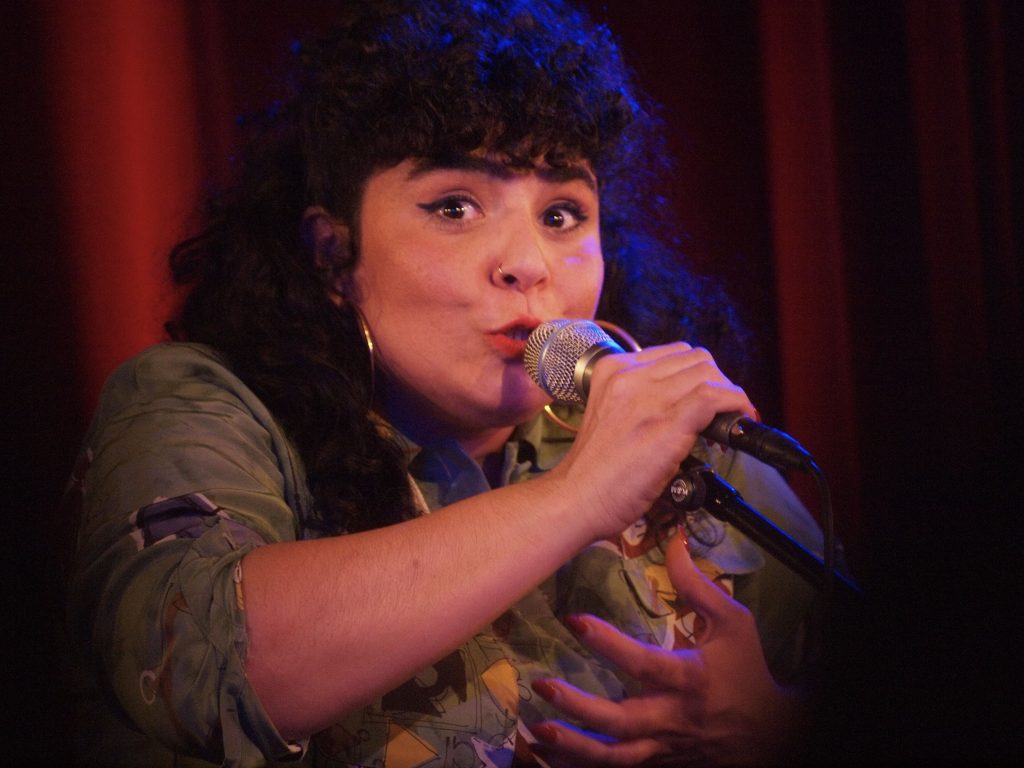
Differences in Life Path The differences between Meral’s parents went beyond language. Her father had just arrived in the Netherlands from Turkey when he met the love of his life. He taught himself Dutch and found work as a painter. ‘He always felt the need to prove himself and had a huge drive. My mother was only sixteen and initially lived in fear, mainly because she didn’t know where she ended up.’ Her mother’s joy of life blossomed in the Netherlands, leading her to explore and fully enjoy life. ‘We went on vacations together, on outings. She still enjoys life as if she wants to make up for lost time.’ Her parents’ different life paths also influenced Meral: ‘Because of my father’s relentless striving and the pressures he experienced, I occasionally need a breather. I inherited the optimism from my mother and the drive from my father.’
Decoding and Healing Trauma
As Polat discusses her father’s youth, the tone becomes more serious: ‘Then we’re talking about trauma that is passed down from generation to generation. What does it do to you when you’re not allowed to exist? When you’re not allowed to be? When you have to hide your religion and identity, and you’re not allowed to speak your own language? You feel very different in a place where your father could move freely than in a place where he always had to be on guard. The Kurdish people have a very traumatic past. As a child of the diaspora, I felt that very strongly with my parents. And I know I carry their trauma. Moreover, I’m a woman; I’ve let all kinds of restrictions and boundaries be imposed on me by my environment, even though I often don’t even feel the discomfort of it myself. Decoding and decolonizing that trauma within myself to then heal it has been a very important research question for me over the past two years in the context of Fast Forward.’
Preparing for the Trajectory
Before embarking on a Fast Forward trajectory with the Fonds Podiumkunsten, there are several steps. To start, artists cannot apply themselves. The fund has a number of scouts who seek out artists who – in the words of the fund – ‘could benefit from an international context to take a new step in their artistic development.’ Meral adds: ‘If you are nominated, there is a meeting with all the scouts where your career is discussed. If a Fast Forward trajectory seems suitable for you, you will then receive an invitation to put your ideas on paper. Those ideas then go back to the scouts, and if there is enough basis to proceed, you as the creator will receive a budget for preliminary research to develop concrete plans for the trajectory and approach potential partners. The scouts remain available to spar with and assist you with advice and action.’
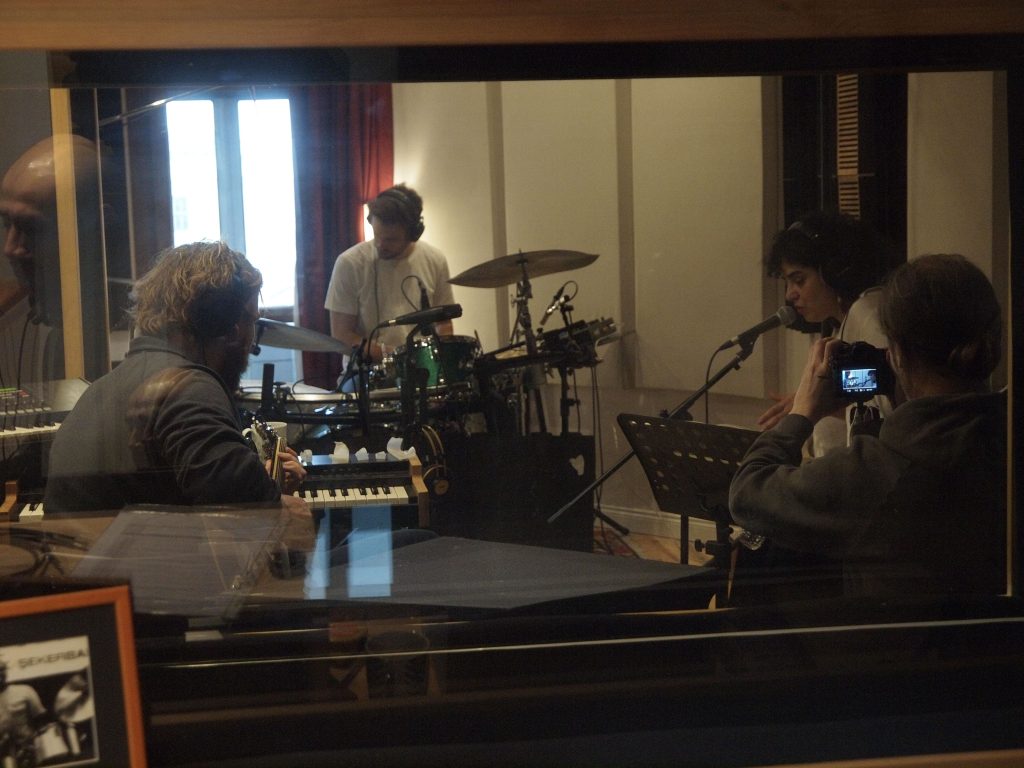
Space and Time
What has the Fast Forward trajectory yielded for her? ‘It has mainly given me the time and space to develop into a full-fledged singer. And also into a full-fledged artistic leader of my newly founded foundation, Babisko. From there, I now initiate projects where I can apply everything I have learned over the past two years and the values I have gained from my background and artistic development. I have been given the time and space – also financially – to establish a bond with these fantastic musicians and to literally come from scratch to where we are now, to be able to connect with foreign producers, mixers, musicians, graphic designers, to collaborate and to research and study everything, such as music theory and solfège. I could take singing lessons from various disciplines. I could participate in various showcase festivals with my band, profile my band, and create an international network… It has given me time and space to travel to Dersim for research with my band members for ten days, for which I also had the opportunity to thoroughly investigate beforehand what exactly I wanted to do there, who I wanted to meet, and so on. And all of this has now resulted in a debut album that has done incredibly well in the music world. Not only in the Netherlands but internationally as well. And all this while we don’t even have a label yet and handle the distribution ourselves online!’
Shortly after returning to the Netherlands, the Meral Polat Trio gave a sold-out concert at the Tilburg jazz club Paradox. The concert photos accompanying this article were taken there.
More information can be found at meralpolat.nl.
Link to the original interview before translation: https://www.mixedworldmusic.com/nieuws/newsItem.php?n01ID=29231





